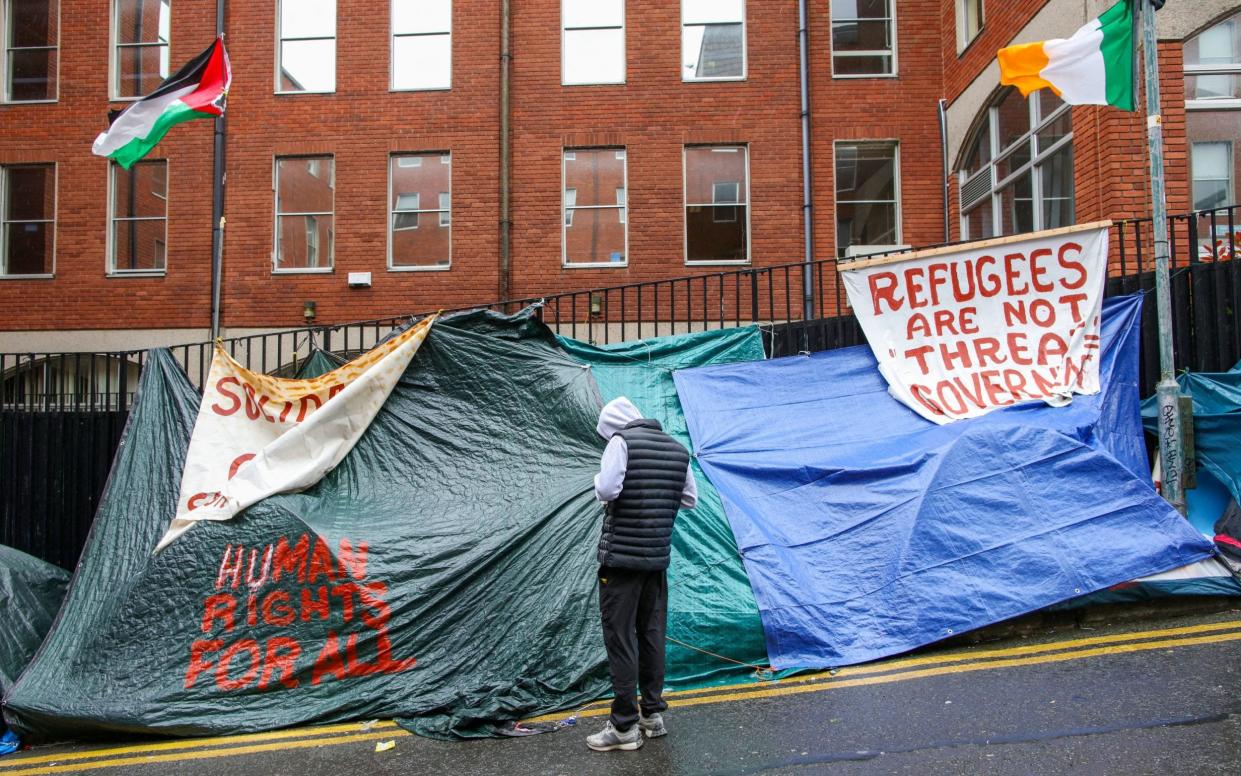Europe’s migrant chaos has engulfed Dublin’s streets

Walking along a tent-strewn shanty town on a Georgian street in central Dublin, I was reminded of Oscar Wilde’s novel, The Picture of Dorian Gray. The book’s protagonist, Dorian, sells his soul to remain young and beautiful, while his portrait, hidden in an attic, continues to age and visually documents each one of his sins.
The tent city, like Dorian’s picture, is something Irish leaders would prefer hidden from public view – because it jars with the image of Ireland as an empathetic and responsible country that they like to project. So when Britain’s press arrived this week to photograph the migrant camp, outside Dublin’s International Protection Office (IPO), there was a scramble to maintain the facade. “We do not live in a country where makeshift shanty towns are allowed to just develop,” pronounced Ireland’s Taoiseach.
The camp was promptly cleared away on Wednesday and its occupants were bussed to better accommodation, which had, all of a sudden, become available. The site was last bulldozed ahead of St Patrick’s Day (another occasion when all eyes were on Dublin) to little effect: the occupants were sent to Crooksling, on the outskirts of the city, but decided they preferred the city centre and trekked back en masse.
The tents are a human tragedy but also a damning portrait of the Irish government’s immigration policy – which has for years welcomed far more people than Ireland can house, with ministers insisting they had a “moral and legal” obligation to do so. This has left asylum seekers sleeping rough as the government scrambles to strike deals with hotels and landlords across the country to house them, before more arrive.
With each new arrival, Ireland’s “international obligations” have, in turn, been thrust upon the Irish people. “I have to clear tents from outside the shop every day,” an owner of a cafe near the camp tells me. “It’s horrible having to wake them up – they often don’t know why you’re kicking them out, a lot don’t speak English”.
The camp has long been a growing concern even among Dublin’s most pro-immigration residents. At the cafe next door, many patrons initially sympathised with the Irish government’s laxed migration policy. But the owner’s noticed a shift in the mood – to one of anxiety and fear as the camp continued to swell.
The once spacious street became claustrophobic: rows of tents halved the walking space on the pavement, meaning people had to step into the road to get around each other. The government had also declined to provide the camp with a serviceable toilet. “There is a smell of urine and faeces everywhere,” the cafe owner informs me. “I’ve stepped in it”. The area is also littered with food, attracting rodents. Locals feared this, combined with the absence of showers, would cause an outbreak of disease.
Unsurprisingly, people gave the area a wide berth. Many people working in the street’s red-brick offices took to working from home; footfall to local restaurants and pubs dwindled; residents complained of gangs of young men drinking and playing loud music at night. Many women did not feel safe passing by the camp, which hosts around 200 men, and so avoided the area altogether. The cafe owner says he’s sent countless emails to government departments, to no avail. Other businesses on the street, who’ve been similarly ignored, have threatened the government with legal action if it doesn’t relocate the migrants.
It took the arrival of the international press this week, amid a diplomatic row between Ireland and the UK, for the government to take action. The spat began after Dublin claimed more than 80 per cent of asylum applicants arriving in Ireland in recent months had crossed the Irish border. Micheál Martin, Ireland’s deputy prime minister, claimed this influx was spurred on by Britain’s Rwanda policy.
I spoke to a 27-year old Nigerian who told me he arrived at the IPO this week under circumstances which were rather different. He says he felt unsafe in Nigeria after the farm he worked on in the north of the country had been attacked by “bandits” in 2022. A French NGO worker in Nigeria helped him to board a plane to Paris and obtain a French passport, but advised him to travel on to Ireland. The Irish government says the handful of visas it has issued to Nigerians in recent months can’t account for the thousands which have arrived. But this young man’s case suggests many of these asylum seekers could indeed be coming from Europe.
The Irish government is clearly keen to find a scapegoat for its ill-thought out migration policy. But it is high time they took a hard look at their own unflattering portrait.

